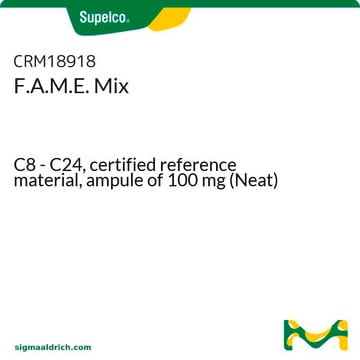73417
Bisphenol A (2,3-dihydroxypropyl) glycidyl ether
analytical standard
Synonym(s):
2-[4-(2,3-Dihydroxypropyloxy)phenyl]-2-[4-(glycidyloxy)phenyl]propane, BADGE-H2O
About This Item
Recommended Products
grade
analytical standard
Quality Level
Assay
≥95.0% (HPLC)
shelf life
limited shelf life, expiry date on the label
technique(s)
HPLC: suitable
gas chromatography (GC): suitable
application(s)
cleaning products
cosmetics
food and beverages
personal care
format
neat
storage temp.
2-8°C
SMILES string
CC(C)(c1ccc(OCC(O)CO)cc1)c2ccc(OCC3CO3)cc2
InChI
1S/C21H26O5/c1-21(2,15-3-7-18(8-4-15)24-12-17(23)11-22)16-5-9-19(10-6-16)25-13-20-14-26-20/h3-10,17,20,22-23H,11-14H2,1-2H3
InChI key
NBLIPZBCGXIEFO-UHFFFAOYSA-N
Related Categories
General description
Application
Packaging
Other Notes
Recommended products
Signal Word
Danger
Hazard Statements
Precautionary Statements
Hazard Classifications
Eye Irrit. 2 - Resp. Sens. 1 - Skin Irrit. 2
Storage Class Code
11 - Combustible Solids
WGK
WGK 3
Flash Point(F)
Not applicable
Flash Point(C)
Not applicable
Personal Protective Equipment
Choose from one of the most recent versions:
Already Own This Product?
Find documentation for the products that you have recently purchased in the Document Library.
Customers Also Viewed
Our team of scientists has experience in all areas of research including Life Science, Material Science, Chemical Synthesis, Chromatography, Analytical and many others.
Contact Technical Service




![Bis[4-(glycidyloxy)phenyl]methane mixture of isomers](/deepweb/assets/sigmaaldrich/product/structures/915/436/edb8eab6-834e-4238-a904-bf72c573b686/640/edb8eab6-834e-4238-a904-bf72c573b686.png)






